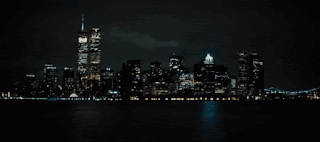Francis Ford Coppola isn't a name that many would've expected to see on a blog like this one. But here we are. After all, I'm a sucker for a passion project (this one self-funded) where the filmmaker really has no one telling them to put the brakes on, to trim the script, to edit the superfluous, to tweak a performance or line delivery, or even to put some polish on a special effect or two.
 |
| I could make a case for this being the reason why the Star Wars prequels are...what they are. But that's not why we're here. |
This is Megalopolis - a film that features more stars than one of those glow-in-the-dark sticker sets you peeled and pasted onto your ceiling and offers each of them an opportunity to show their characters in every light on the spectrum while not adopting much of a shape to those characters at all in the process. In essence, watching the characters in this movie interact with one another is like looking through a Collidescope - what you're looking at is twisted and transmogrified into geographic shapes, disassociated from what is on the other end, and on top of that, no matter who looks through the tube, none of them see the same thing.
 |
| "Oh look! Jon Voight is still alive." |
There is, ostensibly, a plot to the presentation. Cesar Catilina (Adam Driver) and Mayor Franklin Cicero (Giancarlo Esposito) are at odds over a building site in the city. The Mayor of New Rome wants to build a casino - for an immediate tax influx. Catilina wants to build The Megalopolis, a vaguely utopian construction, out of a new building material which he discovered, called Megalon.
 |
| No, not that one. |
There's some bad blood between these two men, and it's not just this building site. The Mayor was previously a district attorney and prosecuted Catilina after the disappearance of his wife. Though he was acquitted of the crime, questions remain about her disappearance. Those questions continue to haunt Catalina as he tries to carve out a small portion of the city to create his utopian segment out of Megalon. Meanwhile, Shia LaBeouf's character, who is a nephew to the world's richest man (Voight) - as is Catalina, slinks around trying to play political games in the hope of inheriting a bank.
But through and around and in-between this cacophony of characters bantering about their interpersonal and political issues, they deliver attempt after attempt at Shakespearean scenes of "important people" in "important rooms" talking about "important things" meant, presumably, to impart wisdoms and metaphors to us, the audience. And there are a LOT of metaphors imparted. These metaphors are so direct that one might think the director worried his audience was too dense to grasp them, but they also attempt to connect to a version of our current reality and Coppola's idea that America is in its "Fall of Rome" era.
 |
| You might say that's a pedestal, or platform, for their ideas. Subtle. |
 |
| Justice is tired. Understand? Tired justice. The statue visually represents Justice, and you can see that it's exhausted. Get it? |
This movie is difficult to watch in more ways than one. Firstly, I mean it's a slog - it took me three attempts of getting through the first hour and four more separate attempts to finally breach the remaining hour and a half. That's largely because it's completely divorced from reality - and not in an entertaining and engaging way. There's no "suspension of disbelief" while watching the film. Instead, it's watching actors who don't behave much at all like real people in situations that only resemble reality as much as a metaphor of an analogy resembles the painting of its photograph described in three words or less.
Secondly, "difficult to watch" means that there are limited ways to do so. You can't rent this movie to stream in the US. You can't go to the library and check out the DVD. Coppola has tightened his grip, and it is only experienced in the theater...with him as your host and a Q&A afterwards.
 |
| "Mr. Coppola, my first question about the film is: What the fuck, man?" |
Throughout the movie, there are many ideas, and commentary, and commentary about ideas happening all at the same time, trying to embrace or refute one another, and never coming together into a cohesive message. It's kind of like that guy in the kitchen at 4am who has the media literacy of the average Elon Musk fan trying to explain how some historical fact was actually mentioned in an obscure, foreign text that he heard someone mention once from across the room and he's been awakened to its deep personal and universal meaning because of a cartoon that he watched yesterday. Sure, some of those things may be true. Some of them might be connected to one or more of the other things. But you don't care because there isn't any compelling reason to other than saying you do so he'll shut the hell up.
Ultimately, like a Lovecraftian horror, the longer you look and attempt to contemplate this movie, the more the madness will creep upon you.
Recommended only for those willing to go to great lengths to watch it, and who are prepared to be severely disappointed afterwards.

_poster.jpg)















